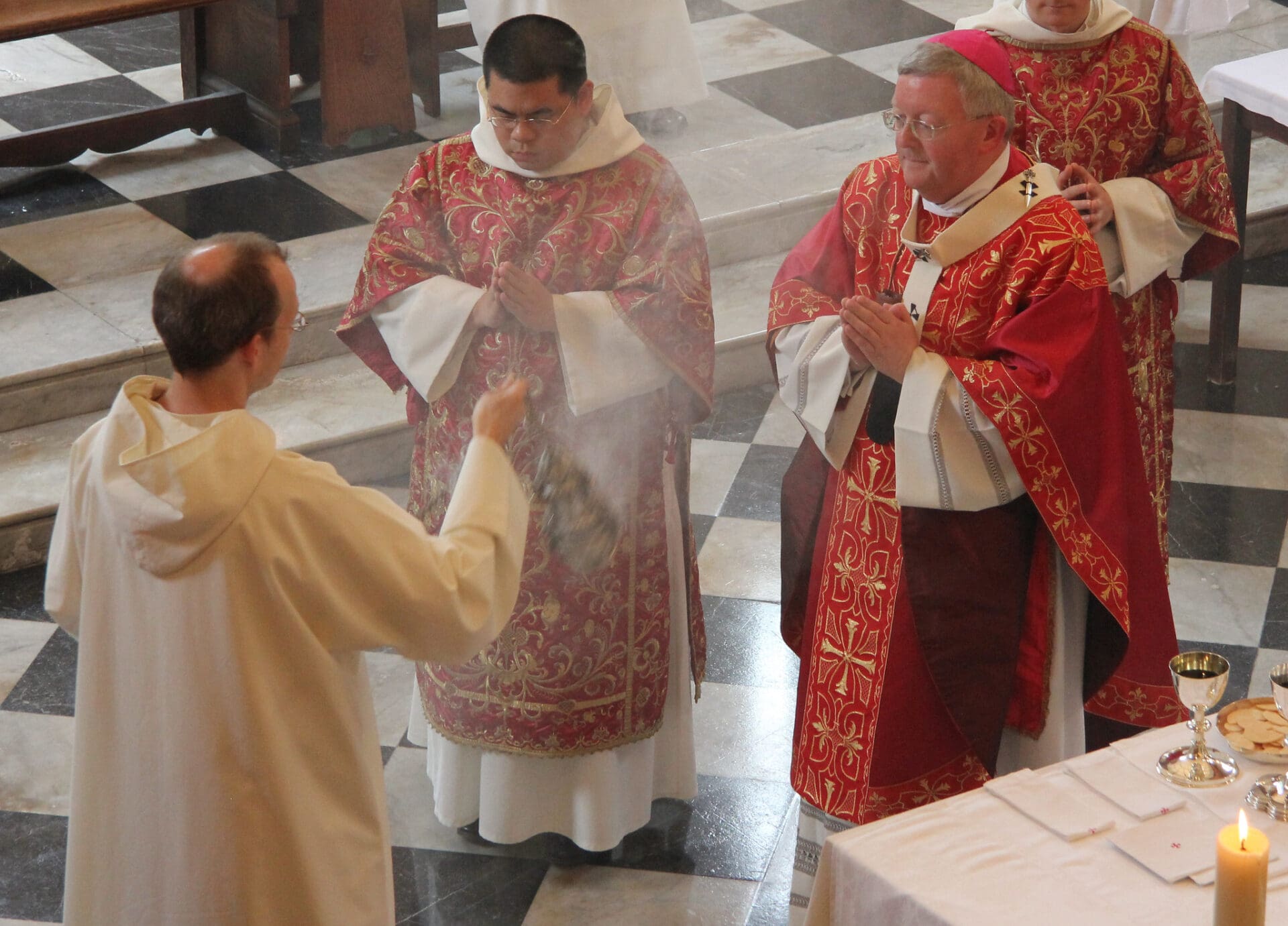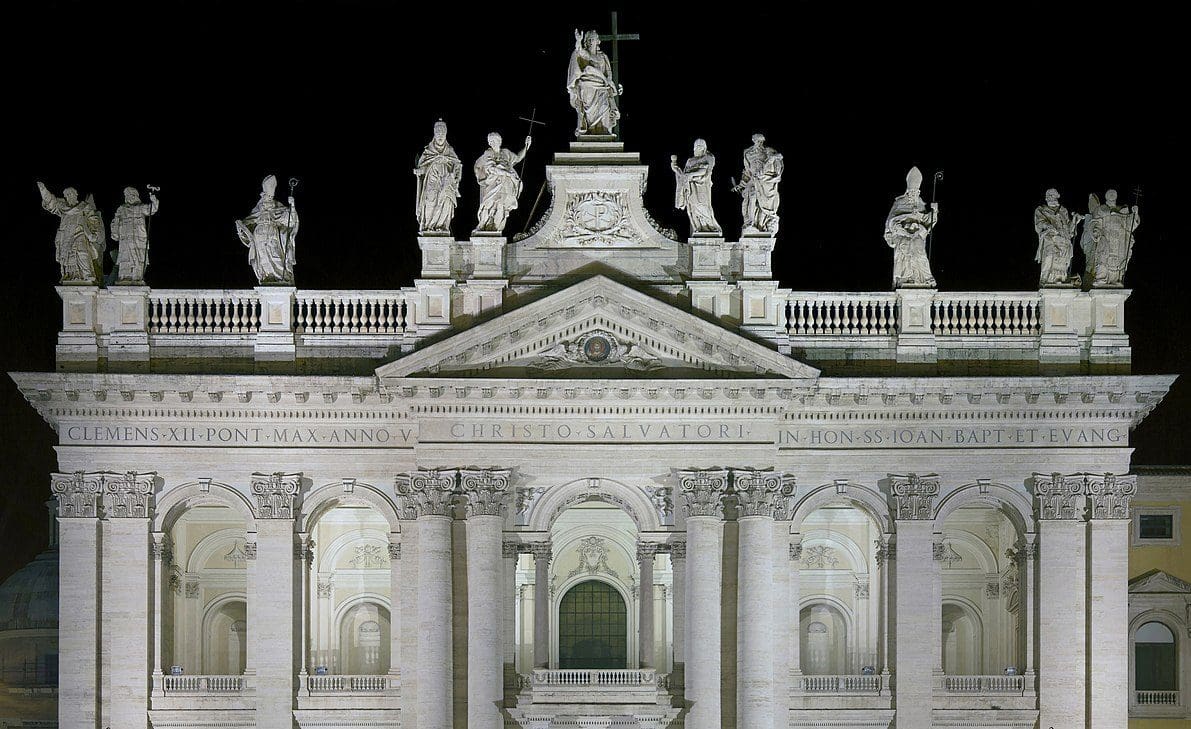A priest in my diocese regularly changes the Communion call in the Mass from “Happy are those who are called to His supper” to “Blessed are those who are called to His supper”.
I am as averse to gratuitous changes in the Mass as anyone, especially those that distort or prescind from the Faith as so many ICEL translations seem designed to do. But this priest’s change is not gratuitous. Though in order to uphold the authority of the Church, one may deplore any change in the approved text, doing so does not mean that the texts are what they should be.
The word “happy” should in almost every case, both in the Lectionary and in the Sacramentary, be changed to “blessed”, for the latter expresses the intended meaning better. Further, one might argue that changes that bring the translation into line with the original language and meaning are essentially different from changes that yield political correctness or compliance with some other diktat of the Zeitgeist. Father’s alteration of the word “happy” reverses one of the multitudinous inadequacies of the ICEL liturgical translations, which, as Adoremus Bulletin readers know, often bear a distant and twisted resemblance to their originals.
I am rightly told that “happy” is one acceptable translation of the Latin “beati“. But that does not mean it is best. Possible translations abound for almost every word. The New American Bible recently translated the Greek word “magos” as “astrologer” rather than “wise man”. This too was a possible translation. But it was evidently chosen precisely in order to denigrate the Infancy Narrative by associating that narrative with unsavory elements of contemporary culture. As if the Wise Men were to be identified with the disreputable feature just beneath “Ann Landers” in the daily press, or with the palm reader next door to the pawn shop.
The Latin lines in question are, “Ecce Agnus Dei, ecce qui tollit peccata mundi. Beati qui ad cenam Agni vocati sunt”.
The phrase is literally translated, “Behold the Lamb of God, behold (Him) who takes away the sins of the world. Blessed are those who are called to the supper of the Lamb”.
The question is which is the better translation of the Latin “beati“ “blessed” or “happy”? Here is why I think “blessed” is better.
“Happy” comes from the Middle English “hap”, which was borrowed from Old Norse (although the morpheme “haep” existed in Old English). The word meant “chance” or “fortune”. Etymologically, “happy” means “favored by chance or fortune” having plenty of “hap” .
Although we Christians speak of “luck” or “fortune”, these words refer in their origin to thoroughly pagan concepts. We should rather think in terms of Providence.
Though rare in modern English, “hap” can also mean “blind chance” or “sheer accident”. In this meaning the word denotes an absence of design or intention in the state of things. Thomas Hardy, that pessimistic, old gloom-monger, used this bleak meaning in his poem, Hap:
If, but some vengeful god would call to me
From up the sky, and laugh: “Thou suffering thing,
Know that thy sorrow is my ecstasy,
That thy love’s loss is my hate’s profiting!”
Then, would I bear it, clench myself, and die,
Steeled by the sense of ire unmerited;
Half-eased in that a Powerfuller than I
Had willed and meted me with the tears I shed.
But not so. How arrives it joy lies slain,
And why unblooms the best hope ever sown?
Crass Casualty obstructs sun and rain,
And dicing Time for gladness casts a moan.
These purblind Doomsters had as readily strown
Blisses about my pilgrimage as pain.
The poet’s vision is of a world where everything comes to us by chance; all is the work of the half-blind judges Casualty and Time. Whether we prosper or not bears no relation to our deserts or to any divinity or purpose. The speaker objects. He would rather, he says, be hated than ignored by cosmic powers. He would rather have a malignant god than none at all. But to no avail, for only “Hap”, or chance, reigns in his universe, which was awash in Darwin’s wake.
Now skip a hundred years. Although the current word “happy” sometimes means “fortunate” or even “blessed”, more often it merely denotes an affective state — euphoria, satisfaction, or a condition of “feeling good”. This is the usage in the overwhelming number of cases (“Are you happy with your new Yugo?”) That is why, when a speaker of modern English wants the word to mean more than “feeling good”, he usually adds something to it he must talk about being genuinely happy, or having true happiness, or some such modification. Otherwise, the word is only about a pleasant emotion.
It is easy to see how inappropriate this meaning is in the context of the Mass. At a funeral Mass, for instance, must we think of ourselves as “happy”, i.e. “cheerful”? To what extent should we Catholics be happy in this sense smilingly superficial about the condition of our society or our own sins or problems in the Church? The communicant called forward to receive the Lord may actually be grief-stricken. But he can still be beatus. If he is in charity with his brother, his emotional state of the moment is irrelevant.
The word “blessed” has several clear advantages. It comes from the Old English “blétsian“, which meant “to bless” or “to mark with the sign of the cross”. Thus, “bless”, being a verb, implies an actor, a blesser in this case, God. When we speak of being blessed, we therefore speak of an action of God, not of a condition wrought by a pagan deity or blind happenstance. Still less do we speak of a mere emotional state.
Examples of the use of “happy” in Scripture, where modern translations sprinkle it liberally, degenerate into silliness quickly. In the New American Bible, for example, Psalm 119 begins:
Happy are they whose way is blameless, who walk in the law of the Lord.
Happy are they who observe his decrees, who seek him with all their heart.
But Scripture teaches that those who seek God with all their heart will occasionally have to set their faces “like flint” against the evils of persecution, against temptation, or against ridicule (cf. Isaiah 50.44ff). And yet they are beati.
The face of flint is a clear type of Jesus Himself, as is demonstrated by the use of the reading on Good Friday. Humanly speaking, though Christ was supremely beatus in His Passion, he was hardly having a nice day.
When one considers the prevalent modern meaning of “happy” that is, “lighthearted, cheerful” this passage from Psalm 119 is reduced to incoherence. Again we have to add mentally some qualifier to the word to get the meaning intended: “genuinely” or “truly” or some such. Without special pleading about the word, its meaning is lost. We can supply this pleading, but why should we have to?
The derived noun “happiness” has a special place in American thought, which comes from the phrase of the Founders “the pursuit of happiness”. Once more, however, what is meant is not affective buoyance; still less is it luxuriating in the favors of pagan gods. It is, rather, the true good, or the deep desire of one’s heart.
We are accustomed to making this mental adjustment about the “pursuit of happiness”. But I believe the translators of the New American Bible go beyond our capacity to adjust.
Consider Psalm 72:71 in the NAB, which reads, “May his name be blessed forever; as long as the sun his name shall remain. In him shall all the tribes of the earth be blessed; all nations shall proclaim his happiness”.
Now that is just plain silly. A man can bless God in response to the biblical exhortation “May his name be blessed forever”. But to speak of the “happiness” of God as if He had just won the lottery is ludicrous. For an analogy, try responding to the prayer over the gifts, which begins, “Blessed are you, Lord God of all creation”, with “Happy be God forever”.
In the call to Communion the translators should have used “blessed” instead of “happy”. Incidentally, the Old English “blétsian” comes from “blód”, which means “blood”. (For the vowel difference, think of the modern English “bleed” and “blood”).
Imbedded in the root meaning is the idea of blessing someone with sacrificial blood. This reflection deepens the sense of “blessed” and underscores its meaning for those who are kneeling before the Body and Blood of Christ.


